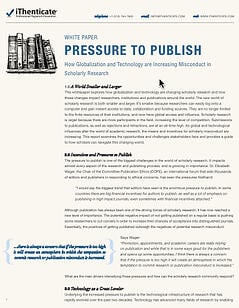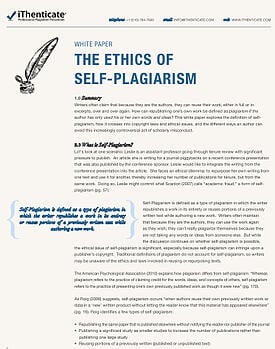Part 1 - Scholarly Publishing - Economic Impact
Menu
-
Solutions
-
Our Solutions
-
AcademicSurface potential plagiarism prior to publication with iThenticate’s expansive content database.
-
AdmissionsScreen personal essays for potential plagiarism and help ensure the highest level of integrity even before matriculation.
-
GovernmentEnsure the originality of public-facing content, from legal documents to grant applications, and reporting.
-
MedicalPrevent invalid findings dissemination, grant misconduct, and improper medical practices.
-
PublishingProtect your journal’s reputation by publishing only the highest quality articles.
-
-
Resources
-
Our Resources
-
FAQFind the answers to the commonly asked questions about how iThenticate works.
-
Content DatabaseComprehensive coverage you can trust across the internet, scholarly articles, and industry papers.
-
GuidanceSearch our comprehensive site for the launch, integration and usage information.
-
-
Pricing
-
Login
-
Buy Credits
 Dan Kimber, a former columnist at
Dan Kimber, a former columnist at  Three
Three 


 Writers often maintain that because they are the authors, they can reuse their work as they please; it couldn't be defined as "plagiarism" since they are not taking any words or ideas from someone else. However, while the debate on whether self-plagiarism is possible continues, the ethics of self-plagiarism is significant, especially because self-plagiarism can infringe upon a publisher’s copyright.
Writers often maintain that because they are the authors, they can reuse their work as they please; it couldn't be defined as "plagiarism" since they are not taking any words or ideas from someone else. However, while the debate on whether self-plagiarism is possible continues, the ethics of self-plagiarism is significant, especially because self-plagiarism can infringe upon a publisher’s copyright. It’s been only a few months since German Defense Minister Karl-Theodor zu Guttenberg resigned after being accused of
It’s been only a few months since German Defense Minister Karl-Theodor zu Guttenberg resigned after being accused of 
 Johann Hari has certainly set off a media frenzy the past two weeks challenging the definition of plagiarism. Last week it was discovered that Hari, columnist for the British newspaper the
Johann Hari has certainly set off a media frenzy the past two weeks challenging the definition of plagiarism. Last week it was discovered that Hari, columnist for the British newspaper the